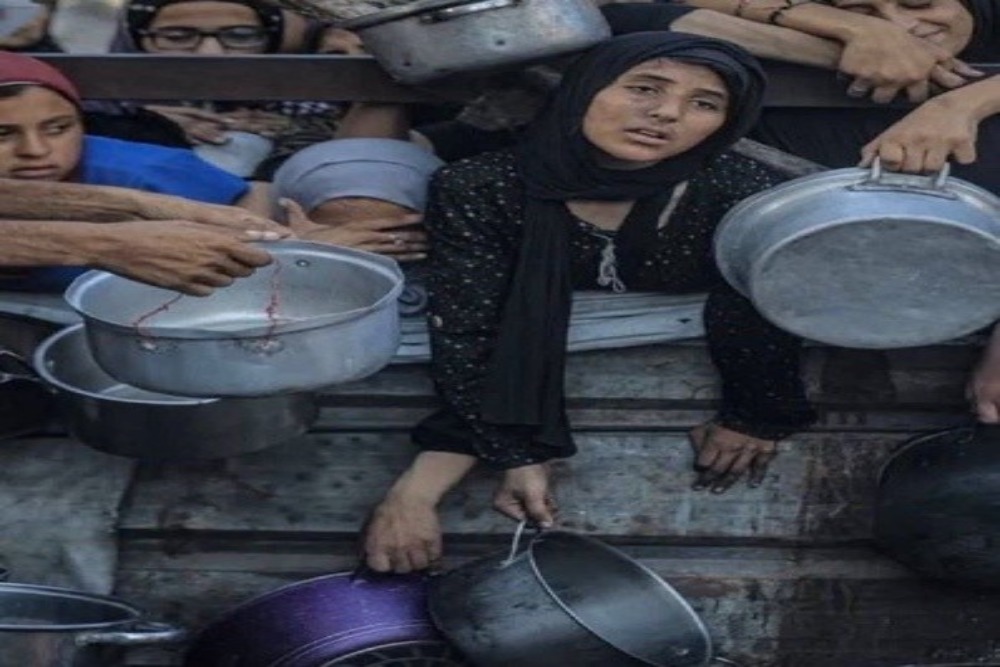
In July 2025, an image circulated in the media: a girl with a dirt-streaked face, disheveled hair, and an empty pot in her hand, staring in horror at a large pot of half-cooked food. A group of children, clutching their pots tightly, rushed crying toward a bucket of food. This image alone judges the world: Does justice still have meaning? Are human rights still a living slogan? Gaza today is the embodiment of the collapse of global conscience.
The war that Israel has unleashed in the Gaza Strip is not defined merely by bombing and artillery; it has become a particular and silent form of genocide through a complete siege, deliberate famine, attacks on medical centers, bombing of food queues, and destruction of vital infrastructure: a slow genocide by starvation, which Article 3 of the 1948 Convention explicitly recognizes as a crime against humanity.
The statistics in July 2025 are more shocking than ever. According to the official report of the United Nations Office for the Coordination of Humanitarian Affairs (UNOCHA), more than 59,000 Gaza residents have been killed. Among them are over 17,000 children and 9,000 women. Additionally, nearly 250,000 people face the risk of absolute famine. More than 90,000 women and children suffer from severe malnutrition. These figures are not provided by human rights activists but by official global organizations such as the WHO and FEWS NET.
Instead of a military war, Israel has waged a war of starvation. According to the UNICEF office report in the last week of July , only two trucks carrying food aid entered Gaza. Meanwhile, official humanitarian estimates indicate that at least 300 trucks per day are necessary to maintain a minimum level of survival. Children waiting in bread lines with empty pots are being shot. In just the past week, 73 people waiting for food distribution have been directly targeted by gunfire. International organizations have explicitly reported that in the areas of Al-Bureij and Beit Lahia, Israeli soldiers have turned bread lines into killing fields.
The crimes do not end with food. In recent days, the European Gaza Hospital and the Nasser Hospital in Khan Yunis have been directly targeted. At Nasser Hospital, only the pediatric ward was operational. Dr. Marwan Sultan, the only active cardiologist in southern Gaza, was killed along with his family. To date, over 1,500 medical personnel have been killed since the start of the war. More than 250 medical centers have been destroyed or rendered unusable. Even ambulances have not been spared from Israeli fire.
Meanwhile, water and sewage facilities have been destroyed. Half of the wells are out of service, and contagious diseases such as meningitis, bloody diarrhea, and skin infections have spread in the camps. The World Health Organization officially described Gaza’s situation as “a catastrophe beyond imagination.”
Yet, the silence of international institutions has become deadlier than bombs. The United Nations Security Council, while holding several emergency sessions within one week over the Ukraine crisis, has only issued ineffective statements in response to the slaughter in Gaza. The United States, through repeated vetoes, has prevented even a single binding resolution against Israel from passing. This institution, which was meant to symbolize global security and peace, today stands as an accomplice to crime.
Meanwhile, the role of the United States goes far beyond diplomatic support. According to the Stockholm International Peace Research Institute (SIPRI), the United States sent over 4.2 billion dollars in military aid to Israel in 2024 alone. Many of the bombs that destroyed schools, mosques, and hospitals are made by American factories. And yet, on international platforms, these same powers speak of “human rights.”
But this crisis is not merely a regional issue. Gaza now reflects the full extent of the moral crisis of the international order. If bombing food lines, killing sick children, and deliberate starvation do not compel international institutions to react, then what can? Should we wait for even greater crimes before we finally hear a voice from the “peacekeepers”?
The responsibility does not lie solely with governments. This is a test for nations. This suffering is not the suffering of Muslims alone; it is the suffering of humanity. Every free individual in every corner of the world must now consider themselves part of this outcry. From Latin America to East Asia, from Europe to Africa, this crime is a shared test of global conscience.
Governments that still have political independence, especially Arab and Muslim states alongside the Islamic Republic of Iran, which has loudly defended Palestine for decades, must take the lead. Legal documentation, pursuing cases in the International Criminal Court, forming diplomatic resistance coalitions, and even military support to defend civilians are part of this historic responsibility.
But without the accompaniment of peoples, this path will remain incomplete. Peoples must raise their voices, hold demonstrations, apply media pressure, and sign international petitions. Because if Gaza remains silent, tomorrow it will be each of our turn. This crime is a crime against all of us.
Human conscience today faces the greatest test of our time. It will either awaken, or it will remain silent forever.
By Fatemeh Kavand










Comments